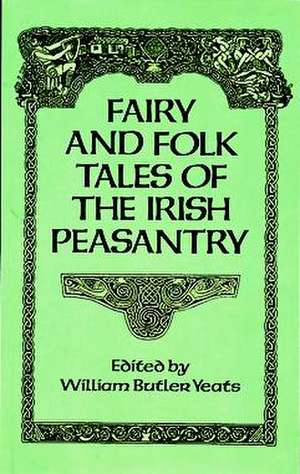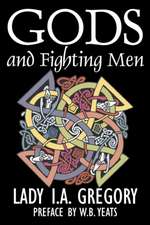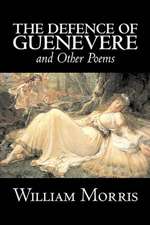Fairy and Folk Tales of the Irish Peasantry
Autor William Butler Yeatsen Limba Engleză Paperback – 31 oct 2011
Treasury of 64 tales invites readers into the shadowy, twilight world of Celtic myth and legend. Mischievous fairy people, murderous giants, priests, devils, and druids star in such stories as "The Soul Cages," "The Black Lamb," "The Horned Women," "The Phantom Isle," and more. Introduction, Notes by W. B. Yeats.
| Toate formatele și edițiile | Preț | Express |
|---|---|---|
| Paperback (2) | 108.84 lei 22-36 zile | |
| Dover Publications – 31 oct 2011 | 108.84 lei 22-36 zile | |
| Aegypan Press – 30 sep 2005 | 149.17 lei 43-57 zile | |
| Hardback (1) | 138.20 lei 22-36 zile | |
| Mint Editions – 26 ian 2021 | 138.20 lei 22-36 zile |
Preț: 108.84 lei
Nou
Puncte Express: 163
Preț estimativ în valută:
20.84€ • 21.43$ • 17.29£
20.84€ • 21.43$ • 17.29£
Carte disponibilă
Livrare economică 27 ianuarie-10 februarie
Preluare comenzi: 021 569.72.76
Specificații
ISBN-13: 9780486269412
ISBN-10: 0486269418
Pagini: 352
Dimensiuni: 137 x 216 x 17 mm
Greutate: 0.35 kg
Ediția:Revised
Editura: Dover Publications
ISBN-10: 0486269418
Pagini: 352
Dimensiuni: 137 x 216 x 17 mm
Greutate: 0.35 kg
Ediția:Revised
Editura: Dover Publications
Descriere
Treasury of 64 tales from the world of Celtic myth and legend: "The Soul Cages," "The Kildare Pooka," "King O'Toole and his Goose," more. Introduction, Notes by W. B. Yeats.
Notă biografică
W.B. Yeats (1865-1939) was an Irish poet. Born in Sandymount, Yeats was raised between Sligo, England, and Dublin by John Butler Yeats, a prominent painter, and Susan Mary Pollexfen, the daughter of a wealthy merchant family. He began writing poetry around the age of seventeen, influenced by the Romantics and the Pre-Raphaelite Brotherhood, but soon turned to Irish folklore and the mystical writings of William Blake for inspiration. As a young man he joined and founded several occult societies, including the Dublin Hermetic Order and the Hermetic Order of the Golden Dawn, participating in séances and rituals as well as acting as a recruiter. While these interests continued throughout Yeats¿ life, the poet dedicated much of his middle years to the struggle for Irish independence. In 1904, alongside John Millington Synge, Florence Farr, the Fay brothers, and Annie Horniman, Yeats founded the Abbey Theatre in Dublin, which opened with his play Cathleen ni Houlihan and Lady Gregory¿s Spreading the News and remains Ireland¿s premier venue for the dramatic arts to this day. Although he was an Irish Nationalist, and despite his work toward establishing a distinctly Irish movement in the arts, Yeats¿as is evident in his poem ¿Easter, 1916¿¿struggled to identify his idealism with the sectarian violence that emerged with the Easter Rising in 1916. Following the establishment of the Irish Free State in 1922, however, Yeats was appointed to the role of Senator and served two terms in the position. He was awarded the Nobel Prize in Literature in 1923, and continued to write and publish poetry, philosophical and occult writings, and plays until his death in 1939.











